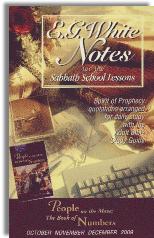|
||||||||||||||
Commentary on "The Second Generation: Admonitions"
Day 6: Thursday, December 17, 2009
The lesson for today, On the Borders, is about Numbers 32:1-5. These few verses do not contain enough information to answer the question that is raised. Along with the notes in the Teacher’s Edition and the other days of this week’s lessons, we are led to think of passing our faith onto the next generation in the way a relay runner passes the baton to the next person to carry. This analogy is a good one, yet passing faith from one generation to another is not exactly how God works in the New Covenant. Each person is responsible for their own faith. Once our children are grown, we can no longer be held responsible for the decisions they make (unless we meddle more than we should, but that is another problem altogether.)
The area of the lesson that needs to be addressed is found in the Teacher’s Edition, on pages 145 and 147. Here there is a dialogue for a skit that demonstrates a typical discussion between a father and son about values. Although there are some similarities between the dialogue presented and actual conversations between fathers and their sons, the entire discussion is very superficial. The last line spoken by the father includes the following:
[D]on’t forget that God loves you and has a plan for your life. Learn from my shortcomings. Don’t repeat them. Choose the best that life offers you.
This is a combination of two completely different ideas. The first part sounds like it is from an evangelistic sermon. As true as it is, we do not evangelize our children by stating that God loves them and has a plan for their lives. And although there are exceptions, our children do not generally learn by our shortcomings. The Bible tells us to train up a child in the way he should go; it never asks us to point out our shortcomings hoping that they will not repeat our mistakes. There are so many different ways to destroy one’s life that just avoiding the mistakes of our parents does not provide a solution to the problems encountered in life.
Christians are called to bear one another’s burdens (Bear one another's burdens, and thereby fulfill the law of Christ. Gal. 6:2), to confess our sins to one another (Therefore, confess your sins to one another, and pray for one another so that you may be healed. James 5:16a), to build each up other in our holy faith (building yourselves up on your most holy faith; praying in the Holy Spirit. Jude 20b). Our children are more aware of our shortcomings that many of us are aware. One only need listen to the children of others to hear of the shortcomings that at times can even be shocking.
Rather than thinking of passing the baton of faith (see Teachers Comments on page 141 of the Teachers Quarterly), perhaps we need to bring our children into the presence of God with us as we seek his guidance in our lives. They can learn to depend upon the leading of the Holy Spirit as we demonstrate that in their presence and lead them to depend on him as well.
Since our children are often (always?) aware of our shortcomings, perhaps there is another way in which we can develop them into disciples of Jesus. Not only do we need to be parents to our children, we need to be accountable to our children. If we are accountable to our children while they are in the home, how much better they will be prepared to be accountable to us once they leave the home.
If a man has a son with whom he argues with often, perhaps the father can ask the son to begin to point out exactly what it is in the father’s life that is incongruous. Of course, the father must be open and non-defensive at this time. If a father can “take it like a man” from his son he may be able to receive invaluable feedback as to how his Christian life is perceived by others. With this information, the father could learn from a source that could be brutally honest, while at the same time drawing his son into a closer, more confidential and trusting relationship with himself as well as God.
Summary
- We do not pass our faith from one generation to the next. We can teach the faith, but it is up to each individual to come to faith in Christ.
- The dialogue between father and son in the Teacher’s Quarterly is unrealistic and superficial. A father can be accountable to his son, which may build a very deep level of trust between the two, allowing the son to be accountable to his father more openly than if the son were “preached” at.
- We are to “bear one another’s burdens,” “confess our sins to one another,” “pray for one another,” and build ourselves up in the most holy faith.” In doing these things, we fulfill the Law of Christ.
GO TO DAY 7
Copyright 2009 BibleStudiesForAdventists.com. All rights reserved. Revised December 9, 2009. This website is published by Life Assurance Ministries, Glendale, Arizona, USA, the publisher of Proclamation! Magazine. Contact email: BibleStudiesForAdventists@gmail.com.
The Sabbath School Bible Study Guide and the corresponding E.G. White Notes are published by Pacific Press Publishing Association, which is owned and operated by the Seventh-day Adventist church. The current quarter's editions are pictured above.
Official Adventist Resources
Standard Edition Study Guide Week 12
Teacher's Edition Study Guide Week 12
Easy Reading Edition Study Guide Week 12
Search the Complete Published Ellen G. White Writings


